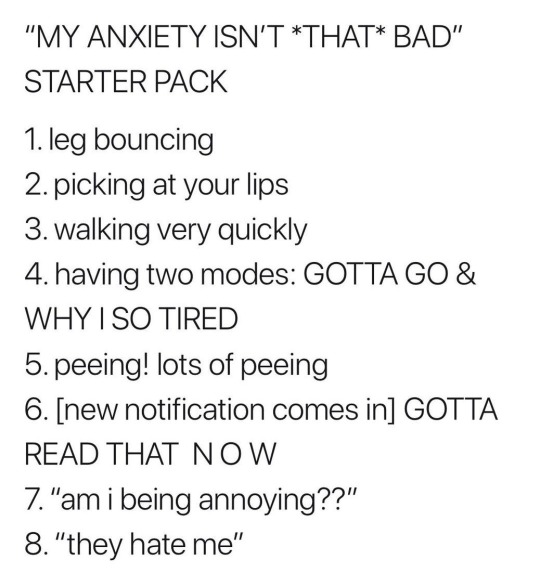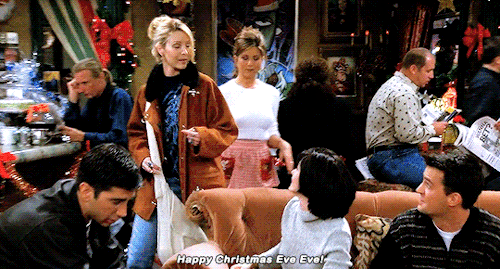Note
How do i write about flying? It gets kinda annoying and repetitive using flap/flapping i just dont know how else to describe it or say whats happening
Flight Words:
Fly/Flying/Flew Soar/Soaring/Soared Wing/Winging/Winged Glide/Gliding/Glided Drift/Drifting/Drifted Float/Floating/Floated Sail/Sailing/Sailed Circle/Circling/Circled Is aloft/Was aloft
Flying Up Words:
Lift/Lifting/Lifted Ascend/Ascending/Ascended Climb/Climbing/Climbed Rise/Rising/Rose Take wing/Taking wing/Took wing Take off/Taking off/Took off Take flight/Taking flight/Took flight
Flying Down Words:
Descend/Descending/Descended Dive/Diving/Dove Plummet/Plummeting/Plummeted Sink/Sinking/Sunk Plunge/Plunging/Plunged
Landing Words:
Settle/Settling/Settled Alight/Alighting/Alighted Touch down/Touching down/Touched down Perch/Perching/Perched Roost/Roosting/Roosted
I hope that helps!
•••••••••••••••••••••••••••••••••
Have a writing question? My inbox is always open!
Visit my FAQ
Find answers fast on my Master List of Top Posts
Go to ko-fi.com/wqa to buy me coffee or see my commissions
122 notes
·
View notes
Text

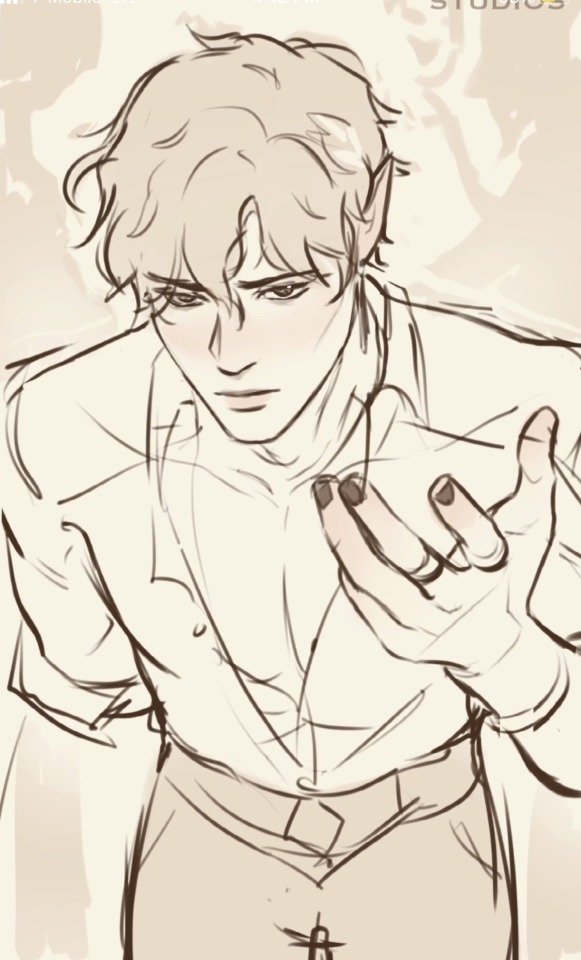
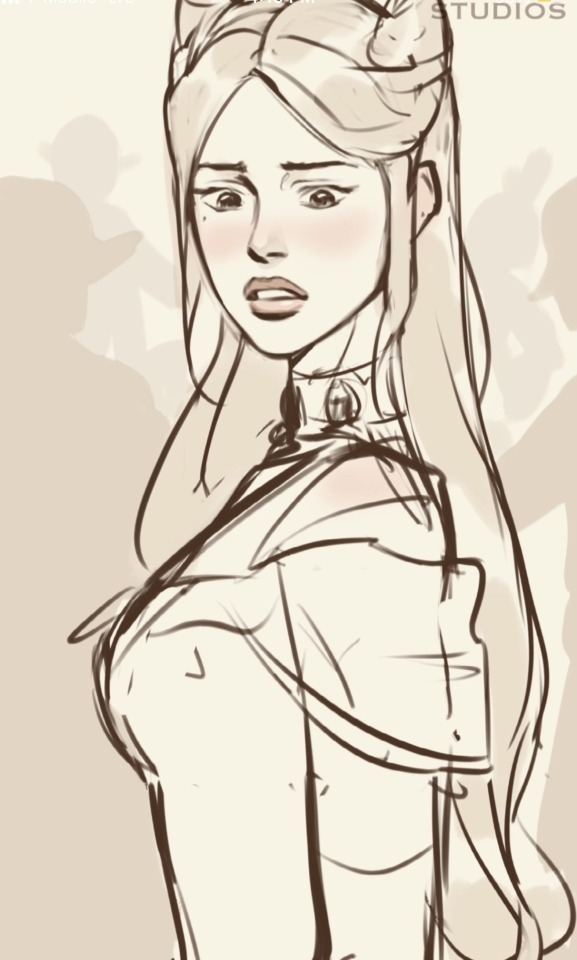
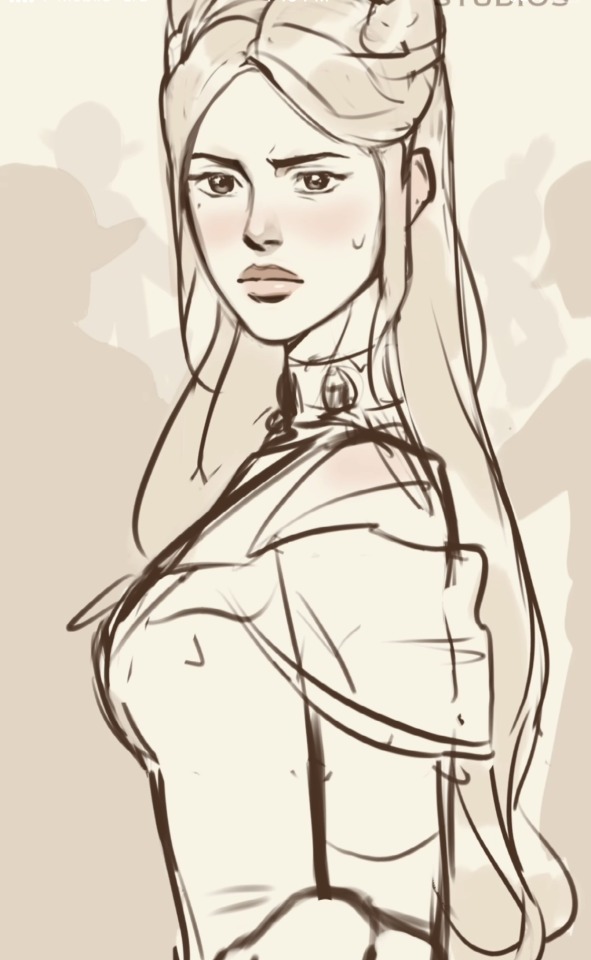
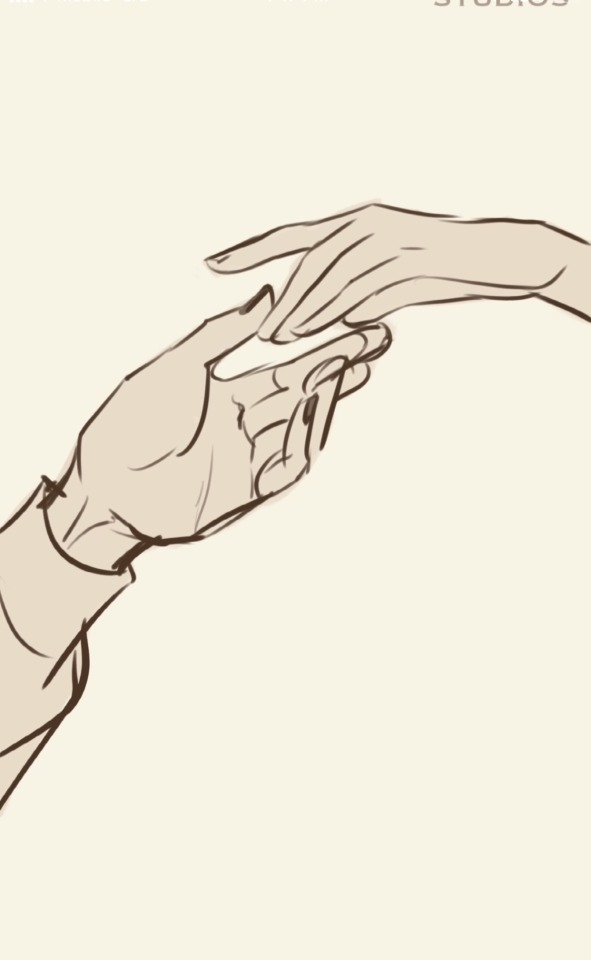
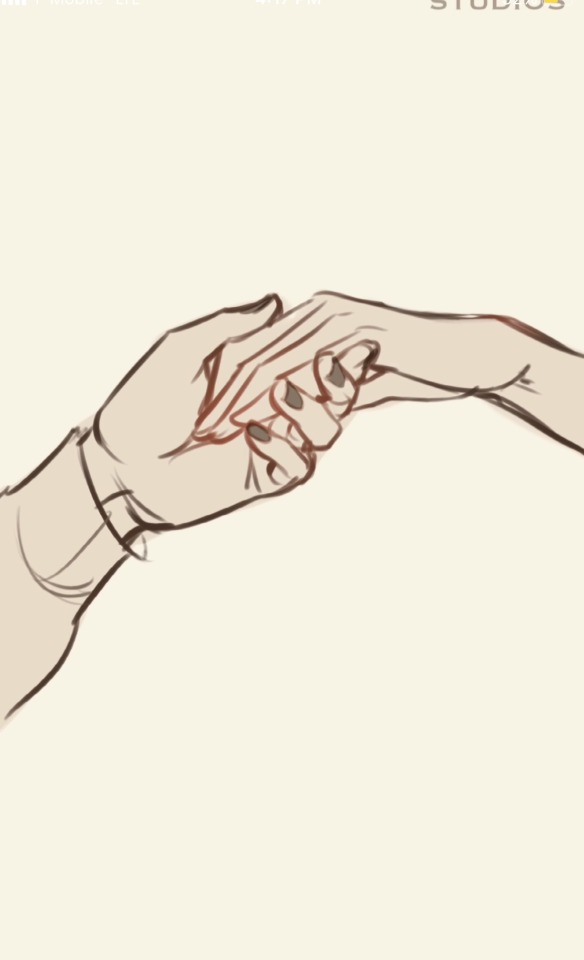
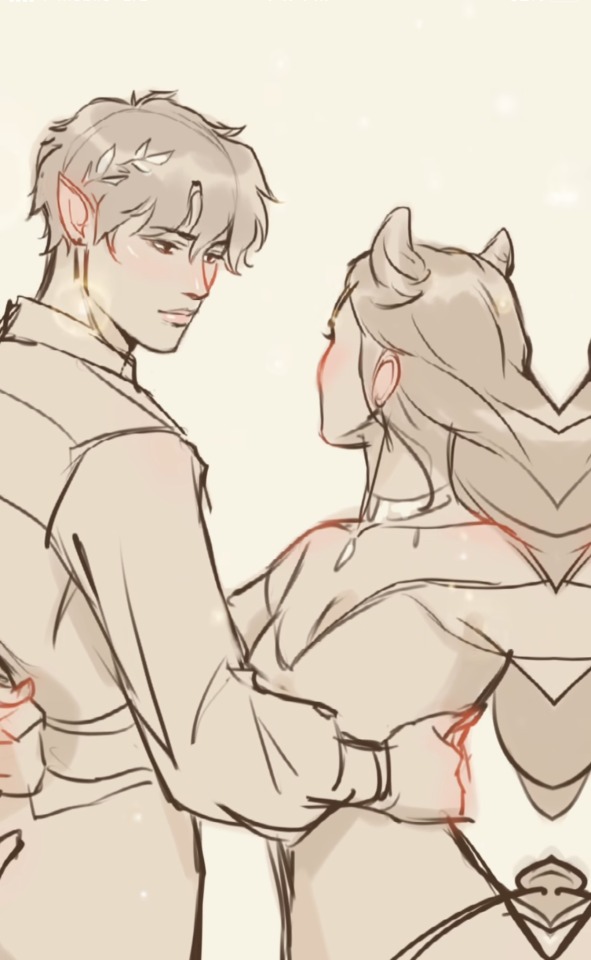
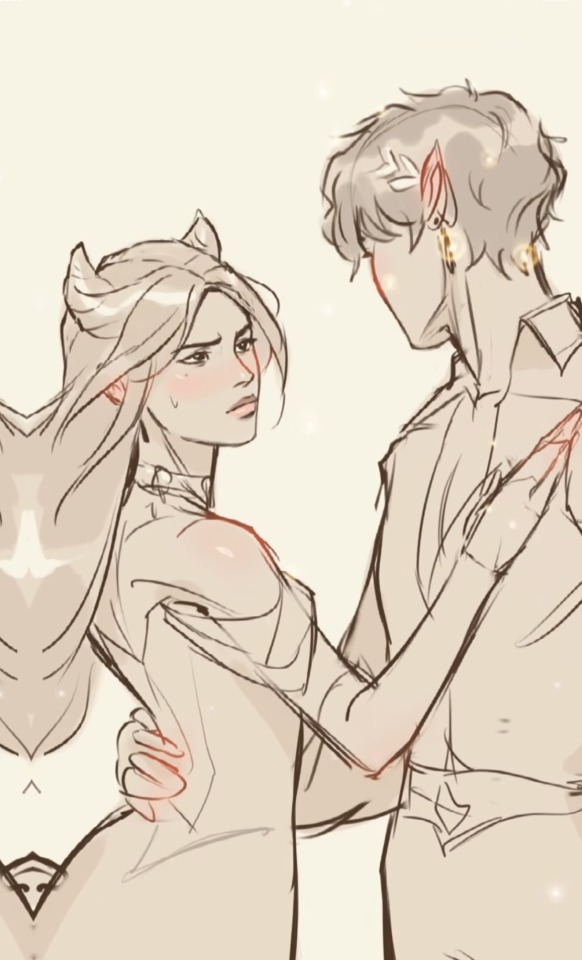

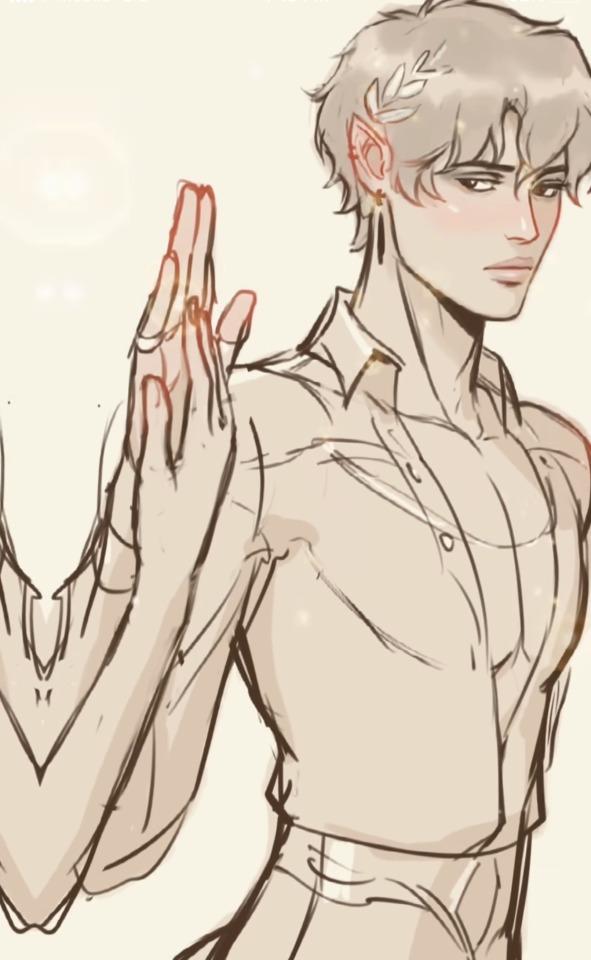
Jude and Cardan - The Cruel Prince
Artist: @/frostbite.studios
5K notes
·
View notes
Text
*through gritted teeth* it doesn’t have to be perfect, it just has to be done. it doesn’t have to be perfect, it just has to be done. it doesn’t have to be-
155K notes
·
View notes
Text
Cal "that's my girl" Calore
and Mare "yes, sir" Barrow
220 notes
·
View notes
Note
How to describe poses properly? I like to think i can write everything else at least ok-ish, but i cannot for the life of me figure out how to describe someone doing a pose
Describing Poses and Body Language
When you say "pose" I don't know if you actually mean posing for something like a photo or for dramatic effect, or whether you actually mean "body language."
A "pose" is when a person moves their body in a particular position to create an impression. This could be posing for a photograph, a model posing at the end of a runway, or simply posing for dramatic effect:



Body language, on the other hand, is how you hold your body all the time, particularly when you're interacting with others.



Describing either one is a matter of simply describing what they're doing:
-- Martin was sound asleep, hands clasped to his chest and drooling out his open mouth. Bart's head was propped on his elbow, his glazed-over eyes blinking periodically. Nelson, on the other hand, watched with hands clasped and eyes wide, utterly transfixed.
-- She laughed and dropped her head, smacking her forehead with the palm of her hand, her cheeks on fire.
-- He frowned and gazed at the floor, one hand on his hip while the other rubbed the back of his head.
-- She was all elegance as she slid on her sunglasses, cocking her head back as her red lips parted in triumph.
-- The model stopped at the end of the runway, hands on hips, head tilted back confidently.
-- Jake dropped to the ground in a silly push-up pose, tipping his head back to meet his flexed leg.
I hope that helps! If I misunderstood your question or if there's something more specific you wanted to know, please let me know! :)
•••••••••••••••••••••••••••••••••
Have a writing question? My inbox is always open!
Visit my FAQ
Find answers fast on my Master List of Top Posts
Go to ko-fi.com/wqa to buy me coffee or see my commissions!
63 notes
·
View notes
Photo
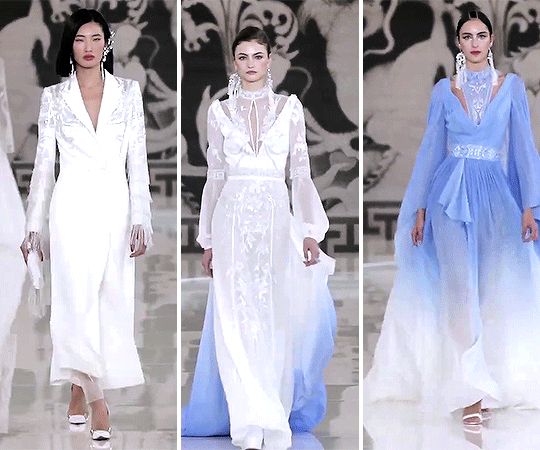

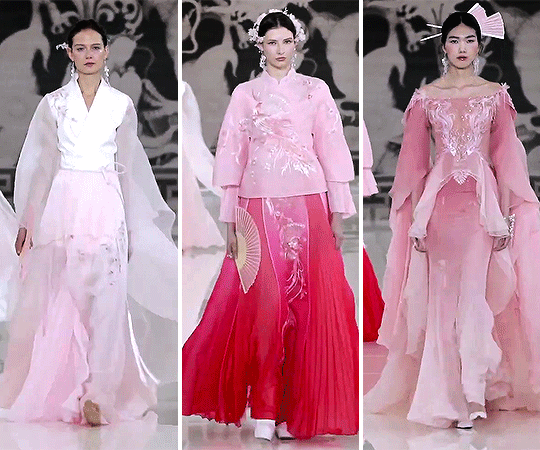

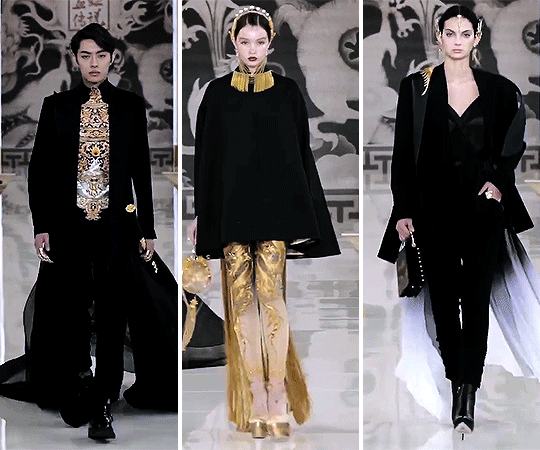


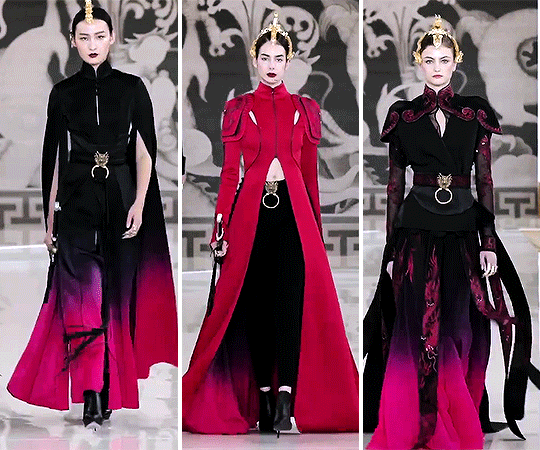

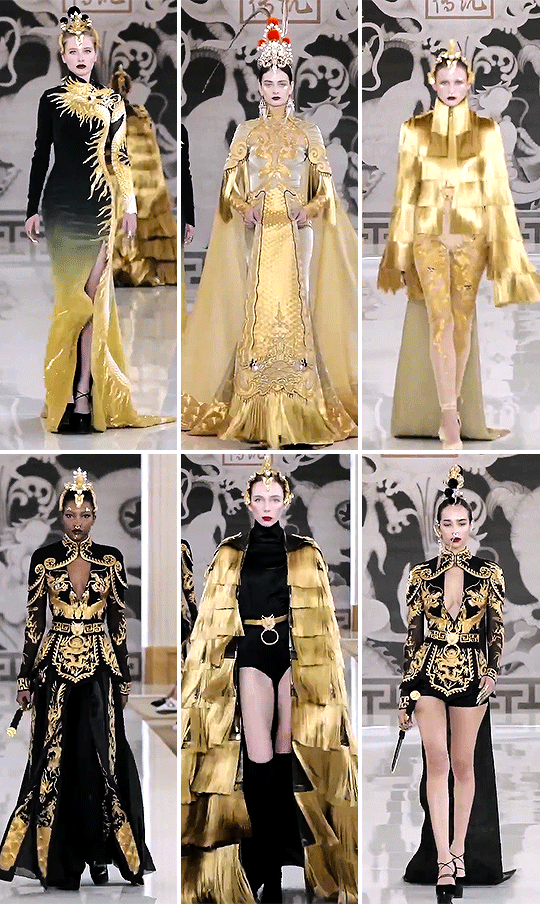
Heaven Gaia 盖娅传说 By Xiong Ying 熊英 ➤ Spring Summer 2020 Paris Fashion Show
5K notes
·
View notes
Note
Hi! I enjoy writing sci-fi and fantasy novels. I've never tried to publish any of them. However, now I'm considering trying to go pro, so I'd like to improve my skills. I've read the classics (Anatomy of a Story, Fantasy Fiction Formula and alike) and also found other good resources, as Brandon Sanderson's Youtube lectures. Do you know of other resources I should be checking, even if they're not specific for sci-fi/fantasy? (Sorry if this has many mistakes, my English is barely decent).
10 Resources for Improving Writing Skills
(Quick side note: your English is great! ♥)
Specific Recommendations:
1. The Emotion Thesaurus and others by Angela Ackerman and Becca Puglisi. This set of books so far covers everything from emotions and positive/negative traits to conflict and setting. Do a flip-through on Amazon to see if it's something you'd find helpful, but a lot of writers find them to be an invaluable resource. Especially The Emotion Thesaurus since it helps you with internal and external depictions of emotion.
2. Random House Word Menu. This book (along with The Describer's Dictonary and others) helps you locate words related to specific topics. For example, if you're trying to describe the weather, you go to the weather section and will find a whole bunch of weather-related words that can level up your description.
3. The Mood Guide to Fabric and Fashion. If you tend to include a lot of clothing and fabric descriptions, this guide is really helpful. Not only can it help you identify the fabric you're imagining, it tells you important things about the fabric (like how it's used) which can make a difference in your description.
4. The Elements of Writing by Strunk and White. Every writer should probably have a copy of this book handy. It's super helpful when you're not 100% sure about a particular punctuation use.
5. Grammar Girl's Quick and Dirty Tips for Better Writing by Mignon Fogarty. This is another great resource for looking up grammatical questions. But you can always go straight to her blog/web site, too.
General Recommendations:
6. Books About Writing. There are zillions of books out there about writing method and process, and different ones work for different people, so the category is much too broad for recommending specific ones to people you don't know. However, anything that's recommended by writers or writing bloggers/vloggers you like are worth looking into. You can also find general recommendation lists. Just remember that most writing advice, method, structure, process, etc. is flexible. Learn about it and use what works for you.
7. Books About Genre. Of course, if you write in a specific genre, you will probably want to read books specific to method and process typical in the genre. Favorite genre writers/bloggers/vloggers and general lists are good sources here, too.
8. Genre Resource Books. There are so many good resource books for various genres. There are books dedicated to portraying accurate details for different eras and settings, books about clothing in different eras, books about survival skills and edible plants... any books like that are great resources for writers, depending on what you write.
9. YouTube Videos. There's honestly no better resource for writers than YouTube, because not only can you find documentaries on just about every topic under the sun, you can find videos that explain everything from gutting a fish to baking a medieval hand pie to how to dress a woman in the 14th century. It's also an amazing resource for researching setting or inspiration setting. For example, if you're writing a Dune-like fantasy set on a planet modeled after the Andalusia region of Spain, you can watch videos about Andalusia as well as sightseeing videos showing different areas, hikes through the wilderness, aerial videos of various areas, etc.
10. Google Street View. Google Earth and Google Street View are another great way to research setting/inspiration setting. Let's say your story is set during the California gold rush in a town that's no longer there. You can look up where it was on Google Earth/Maps and drag the Street View icon around to find areas that have street view, then "walk around" the area to get a ground view of the surroundings. It really helps you imagine your setting.
Have fun with your writing! ♥
•••••••••••••••••••••••••••••••••
Have a writing question? My inbox is always open!
Visit my FAQ
See my Master List of Top Posts
Go to ko-fi.com/wqa to buy me coffee or see my commissions!
389 notes
·
View notes
Text
yes hes my comfort character, and yes he does beat the shit out of people. he multitasks idk
80K notes
·
View notes
Note
Hi!! Hope you’re having a lovely day.
How would one distinguish a cliche vs not a cliche? For example, I’ve been told that “patience running thin” or even “grew silent” are considered cliches… So I suppose my question is how do you go about finding cliches and most importantly how do you avoid them?
Finding Cliche Sayings/Phrases
Two Kinds of Cliches
To clarify, there are two kinds of cliches we worry about in writing fiction:
Cliche Phrases: For example, "Look what the cat dragged in..."
Cliche Themes or Elements: For example, using the "chosen one" theme in the same way others have already used it over and over again, or having an "evil for the sake of being evil" stepmother.
When to Use and Avoid Cliche Phrases
The only time you shouldn't use cliche phrases is in third-person omniscient exposition. In other words, when a third-person omniscient narrator is describing or explaining something to the reader. The reason being that a third-person omniscient narrator is the storyteller, which is pretty much you... the writer. And you, the writer, can do better than relying on tired cliches to tell the reader what you want them to know.
BUT... a third-person limited narrator is describing things through the filter of a point-of-view character, and a first-person narrator IS the point-of-view character. And if these characters are the kind of people who would say, "Look what the cat dragged in..." they could certainly think it. Cliches when used in this way can help to add to your character's voice. However, you still want to be careful about overusing cliche phrases here... either using the same one over again or going overboard in using them at all.
Another time when you can get away with cliches is in dialogue. Once again, if you have a character who would naturally say something like, "Look what the cat dragged in," you should let them because it adds to their voice. It can also tell the reader things about the scene's mood, as well as things about the setting's time and location since cliche phrases are sometimes specific to an era or region.
How to Tell if a Phrase is a Cliche
If you've heard it before, many times, and you know it as a common saying or phrase, it's a cliche. Here are some examples:
all that glitters is not gold
cat got your tongue
don't get your knickers in a twist
cool your jets
read between the lines
without a care in the world
fit as a fiddle
every cloud has a silver lining
all's well that ends well
all is fair in love and war
what goes around comes around
scared out of your wits
nerves of steel
heart-wrenching sadness
only time will tell
If you think a phrase is one you've heard a lot before, but you're not sure, you can always Google it or look for it on a list of cliche phrases.
•••••••••••••••••••••••••••••••••
Have a writing question? My inbox is always open!
Visit my FAQ
See my Master List of Top Posts
Go to ko-fi.com/wqa to buy me coffee or see my commissions!
78 notes
·
View notes
Note
Hi! I’ve been developing this new story for the past 5 (perhaps even more) years, however I feel like I’m less motivated to write it than I was 5 years ago, mainly because the story is now less appealing to me like I’m no longer interested in the idea or the concept. However, I find myself forced to continue with this project because I’m afraid it will be considered a waste of time and effort. So what say you?
Thank you!
Time Spent Developing a Story is Not Wasted Time
Period.
All of the time you put into developing the story--whether you ever actually wrote any of it or not--has made you better at developing stories. You learned things along the way about developing plot and characters, world building, story structure, etc. You also learned things about your writing process and yourself as a writer. All of these things will carry forward into your next project and likely make the whole process flow more smoothly. It was totally worth it.
And, just because you shelve a story doesn't mean it's a lost cause. You may have some sort of epiphany or spark of inspiration at some point down the road that leads you to haul it out and work on it again. Or, you may simply choose to "cannibalize" parts of that story for future projects. Either way, hang onto it.
Right now, there are nine stories sitting on my shelf, written between 2009 and 2017, all in various drafts. They are all stories I decided to walk away from for whatever reason. One of them is the WIP I worked on from 2017 through 2020, and finally set aside. That one, and some of the others, I hope to go back to someday. Even if I never do, I know those projects led me to learn valuable things about writing and myself as a writer, so they still feel like accomplishments to me.
♥
•••••••••••••••••••••••••••••••••
Have a writing question? My inbox is always open!
Visit my FAQ
See my Master List of Top Posts
Go to ko-fi.com/wqa to buy me coffee or see my commissions!
34 notes
·
View notes
Note
I have an African American character in a new story I’m writing. She has curly kinky hair going down to her shoulders. My question is: how would I describe her hair in three different states; wet, recently dried, and dry? Also, how long would it take on average to completely dry? She lives in a relatively cool environment where the sun isn’t normally very bright.
Describing curly hair in various states
Well, it depends on her type of hair. 3C or 4A ? Low porosity or high porosity ?
3C is more curly, 4A more kinky, but I advise you to look it up by yourself as there are more types than just these two (and one can have multiple on its head ! I have a mix of 3B/3C/4A, 3B on the front near my face, 3C for the vast majority and 4A for underneath the sides/back).
Low porosity means that the hair is not likely to absorb anything, high porosity means that it will absorb water/products but reject it as fast as it entered (there are techniques to “lock it up”). Low porosity hair generally keeps its volume even under water, while high porosity hair tends to be wavy when it’s wet, due to water weighing it down.
Oh, and shrinkage entered the chat ! Afro hair generally shrinks when dried, but it varies for one another. For example, my hair shrinks A LOT, meaning that the length I get when they are wet (even though they are low porosity) is totally different from their length once dried, they shorten like crazy.
I advise you to watch videos on YouTube of Black girls doing their hair. You will be able to see their length wet, dried, how they dry depending on how they style it, what methods they use to detangle and so on.
Each head is different, even in the same family, hence why it’s complicated to answer your question with a short answer.
- Mod Lydie
Completely agree with Lydie! Curly / afro hair looks vary, coming in a wide variety of textures, thickness, and porosity. Some folk’s curly hair seems to dry within a second (aka mine…ugh!) while others can hold moisture that seems to cling on for hours on end.
I recommend you do the following:
Determine the general look and hair type for your character
Look up “determining curly hair type” and matching images in relation to said hair (for example, if it’s mostly 4C, look up wet and dry 4C hair images or videos)
Find the appropriate words for these images. I have a words to describe Black hair that was made for you! See the bottom of this post.
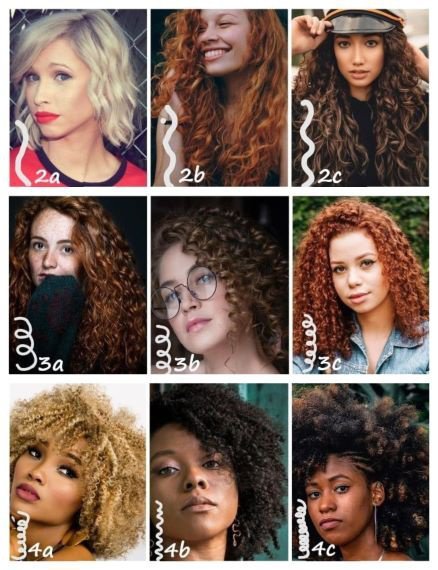
Here’s some more descriptions from the 3 - 4 curly hair range. Feel free to use these terms in your writing. This info is from research I’ve done for my own hair care, mostly based on the NaturallyCurly website.
Hair typing terms and general care guidelines
3 type hair
Curly Twirly 3A
Definite loopy “S” pattern and curls are well defined and springy.
Naturally big, loose and often very shiny.
Size: Sidewalk chalk size.
Best Products: Gels and creams with light moisture and curl definition. Milks and smoothies.
Curly Spirally 3B
Well-defined, springy copious curls
Range from bouncy ringlets to tight corkscrews.
Size: Sharpie size.
Best Products: Gels and styling creams with extra moisture and serious frizz control.
Curly Kinky* 3C
Voluminous, tight curls in corkscrews.
Can be either kinky or very tightly curled, with lots of strands densely packed together. The very tight curls are usually fine in texture.
Size: Pencil.
Best Products: Styling creams, butters, and oils. This hair needs extra moisture and tender care.
*Note on the word kinky: Kinky is not always a well-perceived word, depending on the individual. There’s plenty of alternative words, though.
Read more: Describing Black Hair as “Kinky”
4 type hair
4A Coily Springy
Tight, coily, most fragile curls.
Well-defined “S” Pattern
Size: Crochet Needle or smaller
4B Coily Crimpy
Tight, coily, fragile curls
Less-defined “Z” Pattern
Hair bends in sharp angles
Best Products: Pre-poo with coconut oil or castor oil to help retain natural oils in your scalp.
4C Coily Ziggly
Tight, coily, fragile curls
Curl pattern won’t clump without styling
Less visible definition per individual curl
Best Products: Use a creamy humectant as a leave-in to maximize protection from the elements. A curl defining custard or gelee can stretch the coil safely for twist-outs and braid-outs. Use a detangling co-wash with slippery elm or marshmallow root.
Hair typing is for general use
I recommend these types of hair typing charts to get a more general idea of what you’re going for in terms of the look of hair. But everyone’s hair is different! Hair porosity, width and density informs specific hair care needs, not the hair type.
If you’re not looking for in-depth hair care, but general info just to carry the story along, hair typing terms and assumptions should work just fine for your individual story / characters. Just avoid generalizing. (e.g. her hair is 4c and all 4c hair loses moisture fast! No, OP’s happens to do this, but it’s not a rule for all people with that hair type)
More reading:
Words to describe hair
WWC Description guides
~Mod Colette
Published Jan 2022
2K notes
·
View notes
Note
Hello! In fantasy, if you're basing a fictional language on a real one, are you allowed to change some pronunciations? For example, my MC's name is Halisa but in spanish (the inspiration language) to get that HAlisa, I would need to change the spelling to Jalisa. However, I fear people may pronounce that name the way its spelled, and seeing as its a fictional language perhaps they won't know to pronounce the Ja as Ha. In addition, I find the spelling of Halisa more aesthetically pleassing than Jalisa. But like I said, that would require me basing a made-up language on a real one and then change some pronunciations.
Changing Pronunciation from Inspiration Language to Fantasy Language
Here’s the problem:
In Spanish, the letter H is silent. So in Spanish, “Halisa” is pronounced “ah-lisa” not “ha-lisa.” So, in this case, changing from J to H still isn’t going to get you what you want.
This is one of the pitfalls of changing the pronunciation of a letter in your inspiration alphabet. That change has a ripple effect, and not only might it change the way other letters have to be pronounced, but what you’re going for still might not make sense. For that reason, it helps to at least watch a video on YouTube of your inspiration language’s alphabet.
In the case of your story, you essentially want an English spelling and an English pronunciation, so is there any reason her name can’t just be from another language that exists in your story’s world? Does it have to be from the language you’re basing on Spanish? If so,that’s going to be a tricky change to make.
Do any native Spanish speakers want to chime in with thoughts/suggestions?
•••••••••••••••••••••••••••••••••
Have a writing question? My inbox is always open!
Visit my FAQ
See my Master List of Top Posts
Go to ko-fi.com/wqa to buy me coffee or see my commissions!
14 notes
·
View notes
Text
Black Afro hair and water activities
Black man surfer hairstyles
@whatasmoothgardener said: A character of mine is a young adult black man in a modernish 20-minutes-into-the-future setting who is really into surfing however, I was wondering what black hairstyles might be safe for a male black character that surfs a lot? Most of the posts in the black hair tag seemed to mainly focus on black WOC hairstyles with little on black MOC hairstyles (or at least not a whole lot of examples of them) so I felt didn’t really get a whole lot of info I was looking for in that tag about my question.
Black hair, scuba diving and snorkeling
@endellionaeternus asked:
Hi, I’m writing a short story and I have a black female character who goes scuba diving and snorkeling etc. I’ve researched what I can, and the hair info on this tumblr was very helpful, too. But how would a black woman do her hair for diving? Braids? A bun? And how would sea water affect their hair afterwards? Is there a specific hair product they would use? Thank you!
Styles that work best
Any protective style will be your best bet. Probably a style that won’t get in their way much and is pulled back and away from the face.
Natural hair (especially if hair is very short)
By this, we mean just the hair in its natural afro state. Whether buzzed or just really short, this is one way they might choose to wear their hair.
Cornrows, braids or locs (Especially for mid-length to longer hair)
Cornrows, in particular, lay flat on the head, which would keep them out of the way during water activities. Many braided styles can be braided to the scalp, too.
Braids vary so much in style, from ones that stay adhered to the scalp to free flowing braids, thick to slim. There are styles that include the person’s natural hair only, and styles that add other hair for added styling, fullness and to keep style in tact. How long they last also varies. From one week, three weeks, to two month, it really depends on the style.
Personally, a braided or cornrow style that is more functional makes the most sense to wear. Also, something that relies more on their natural hair would allow them to wash it easier and then re-do the style once it needs a refresh, which will be more often than not if it’s constantly getting wet, isn’t in a cap, etc.
If I were swimmer, I’d opt for a style that’s
Simpler
Can be undone often so I can wash my hair properly
Meant to last 1-3 weeks vs. a month or more
To me personally (Colette) that would also mean:
A lighter hair style, not heavy on the head
Little to no extensions and added hair
A style with fewer braids and probably thicker ones
Preferably, a style that lays flat on the scalp.
Locs
Locs are a permanent natural hair style and a great choice for a swimmer. They’re durable and can be washed as normal.
Bun or ponytail
Whether with natural hair or braided, a bun is a great low manipulation style to keep hair out of the way and contained for swimming.
Examples of great Black swimming styles

Cornrows are a prime choice for a swimmer!

These twin feed-in braids are a great practical style for a Black swimmer.

These fulani braids (a style with patterns created close to the head that then taper out) look fabulous!

Look at all the wonderful style selections in this photo! From thick, sturdy braided style to braided styles close to the scalp, and short natural hair. They’re all great options. x
Styles to avoid or wear seldom
Natural hair, unbound (mid length to long)*
Going into the water with free hair when they’re past a certain length (let’s say a finger), is a big, big, detangling mistake.
*But! That’s absolutely the swimmers prerogative if they want to do this. Maybe they’ve got excellent detangler and patience! Someone who is always swimming, surfing, etc. might not be so keen on doing this all the time, though vs. the occasional swimmer.

Young Michael Jackson with wet, free-flowing natural hair
Small-braids and/or complex braided styles or extensions
A style that involves tons of braids and/or synthetic hair wouldn’t be practical, in my opinion. While protective, they’re less about function and more about style. Plus, sometimes these styles are meant to last for several weeks to a couple months.

Gabrielle Union in micro braids. These small and plentiful micro braids would not be a practical choice for a swimmer.
As a swimmer, you need to wash your hair more often than not, which will make the braids not last as long and get frizzy, especially at the scalp. It’s also a style that usually requires someone to do it at the salon and takes several hours.
Unless your character is just that skilled and has a lot of free time or doesn’t mind getting their hair done super often, it doesn’t feel like the wisest way for one to spend their time and/or money.
Relaxed hair
For one, chemically straightened hair can’t get wet in the beginning. Also getting it wet plus sweat from exercise etc. will revert the curls to their natural state. Not as quick as non-chemically straightened hair, but you’ll still be dealing with frizz and the undoing of your work rather quickly.
Straightened hair (chemical free)
Curls revert back to their natural state when wet. It’d be a constant battle of hair straightening if a regular swimmer kept their afro hair straight. I’d question if they found this worth their time. Now, if they had an extended period where they wouldn’t be getting their hair wet, they might go for it to mix things up.
For more style ideas, I suggest looking up images of Black swimmers and surfers and taking inspiration. You can look on google or see article features about Black surfers. Here’s a few more for you!

Avuyile Avo Ndamase (South African surfer) wears natural hair short here.

A surfer with locs. Great choice!

Surfer Dominique Miller wearing a bun. Another style that just makes a lot of sense!
~Mod Colette and Mod Lydie
2K notes
·
View notes
Text
Words to describe facial expressions
Absent: preoccupied
Agonized: as if in pain or tormented
Alluring: attractive, in the sense of arousing desire
Appealing: attractive, in the sense of encouraging goodwill and/or interest
Beatific: blissful
Black: angry or sad, or hostile
Bleak: hopeless
Blinking: surprise, or lack of concern
Blithe: carefree, lighthearted, or heedlessly indifferent
Brooding: anxious and gloomy
Bug eyed: frightened or surprised
Chagrined: humiliated or disappointed
Cheeky: cocky, insolent
Cheerless: sad
Choleric: hot-tempered, irate
Darkly: with depressed or malevolent feelings
Deadpan: expressionless, to conceal emotion or heighten humor
Despondent: depressed or discouraged
Doleful: sad or afflicted
Dour: stern or obstinate
Dreamy: distracted by daydreaming or fantasizing
Ecstatic: delighted or entranced
Faint: cowardly, weak, or barely perceptible
Fixed: concentrated or immobile
Gazing: staring intently
Glancing: staring briefly as if curious but evasive
Glazed: expressionless due to fatigue or confusion
Grim: fatalistic or pessimistic
Grave: serious, expressing emotion due to loss or sadness
Haunted: frightened, worried, or guilty
Hopeless: depressed by a lack of encouragement or optimism
Hostile: aggressively angry, intimidating, or resistant
Hunted: tense as if worried about pursuit
Jeering: insulting or mocking
Languid: lazy or weak
Leering: sexually suggestive
Mild: easygoing
Mischievous: annoyingly or maliciously playful
Pained: affected with discomfort or pain
Peering: with curiosity or suspicion
Peeved: annoyed
Pleading: seeking apology or assistance
Quizzical: questioning or confused
Radiant: bright, happy
Sanguine: bloodthirsty, confident
Sardonic: mocking
Sour: unpleasant
Sullen: resentful
Vacant: blank or stupid looking
Wan: pale, sickly
Wary: cautious or cunning
Wide eyed: frightened or surprised
Withering: devastating
Wrathful: indignant or vengeful
Wry: twisted or crooked to express cleverness or a dark or ironic feeling
104K notes
·
View notes
